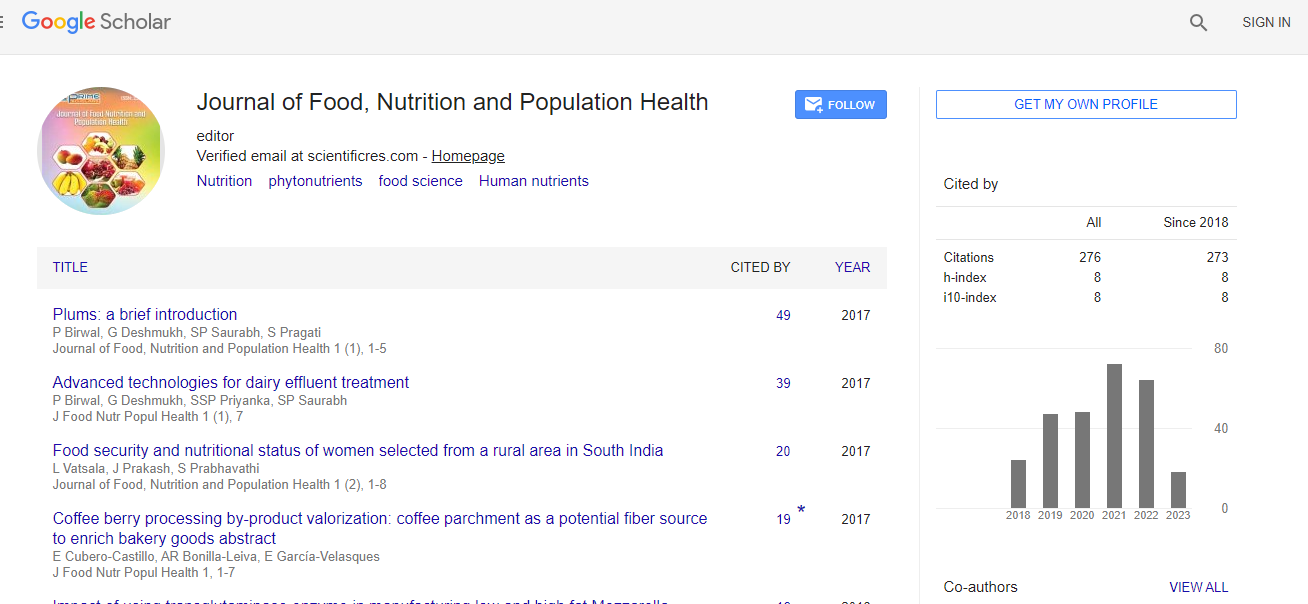Commentary - (2024) Volume 8, Issue 1
Title: The Importance of a Balanced Diet: Nourishing Body and Mind
Oliver Max*
Department of Food and Nutrition, Yale University, USA
*Correspondence:
Oliver Max,
Department of Food and Nutrition, Yale University,
USA,
Email:
Received: 28-Feb-2024, Manuscript No. IPJFNPH-24-19933;
Editor assigned: 01-Mar-2024, Pre QC No. IPJFNPH-24-19933 (PQ);
Reviewed: 15-Mar-2024, QC No. IPJFNPH-24-19933;
Revised: 20-Mar-2024, Manuscript No. IPJFNPH-24-19933 (R);
Published:
27-Mar-2024, DOI: 10.21767/2577-0586.8.01.04
Description
A balanced diet is essential for maintaining optimal health and
well-being. This paper explores the components of a balanced
diet, the benefits it offers, and strategies for achieving dietary
balance. By understanding the importance of balanced
nutrition, individuals can make informed choices to support
their overall health and quality of life. A balanced diet is the
cornerstone of good health, providing the body with the
essential nutrients it needs to function efficiently. In today’s
fast-paced world, where convenience often trumps nutrition,
understanding the principles of a balanced diet is more critical
than ever. This paper aims to elucidate the concept of a balanced
diet, its components, and its profound impact on health and
well-being. A balanced diet consists of a variety of foods that
provide essential nutrients in appropriate proportions. These
nutrients can be broadly categorized into macronutrients
and micronutrients. Macronutrients include carbohydrates,
proteins, and fats, which are required in relatively large amounts
to sustain energy levels, support growth and repair, and
regulate metabolic processes. Carbohydrates: Carbohydrates
serve as the primary source of energy for the body. Whole
grains, fruits, vegetables, and legumes are excellent sources
of complex carbohydrates, which provide sustained energy
and essential nutrients. Proteins: Proteins are the building
blocks of tissues, enzymes, hormones, and immune factors.
Sources of high-quality proteins include lean meats, poultry,
fish, eggs, dairy products, legumes, and nuts. Fats: Dietary
fats are essential for cell structure, hormone production, and
nutrient absorption. Healthy sources of fats include avocados,
nuts, seeds, olive oil, and fatty fish rich in omega-3 fatty acids.
Micronutrients encompass vitamins and minerals, which are
required in smaller quantities but are indispensable for various
physiological functions, including immune function, bone
health, and antioxidant protection. Vitamins: Vitamins such as
vitamin A, vitamin C, vitamin D, vitamin E, and the B-complex
vitamins play vital roles in energy metabolism, immune
function, vision, and skin health. They are found abundantly
in fruits, vegetables, whole grains, dairy products, and
fortified foods. Minerals: Essential minerals like calcium, iron,
magnesium, zinc, and potassium are crucial for bone health,
oxygen transport, muscle function, and electrolyte balance.
Sources of minerals include dairy products, leafy greens, nuts,
seeds, and seafood. Adopting a balanced diet offers a myriad
of benefits that contribute to overall health and well-being
A balanced diet provides the body with the full spectrum of
essential nutrients required for optimal functioning, growth,
and repair. Consuming a variety of nutrient-rich foods can
help reduce the risk of chronic diseases such as heart disease,
diabetes, obesity, and certain cancers. Balancing caloric intake
with energy expenditure promotes weight maintenance and
reduces the risk of obesity and associated health problems.
A balanced diet provides sustained energy throughout the
day, preventing energy crashes and enhancing physical and
cognitive performance. Nutrient-dense foods support brain
function and neurotransmitter production, promoting mental
clarity, mood stability, and emotional well-being. Achieving
dietary balance requires mindful eating habits and a focus
on nutrient-rich foods. Incorporate a diverse range of fruits,
vegetables, whole grains, lean proteins, and healthy fats into
your diet to ensure adequate intake of essential nutrients. Be
mindful of portion sizes to prevent overeating and maintain
energy balance. Use smaller plates, listen to hunger cues, and
avoid mindless snacking. Minimize consumption of processed
foods, sugary snacks, and sugary beverages, which offer
little nutritional value and can contribute to weight gain and
chronic diseases. Drink plenty of water throughout the day
to stay hydrated and support cellular function, metabolism,
and digestion. Plan meals and snacks in advance to ensure a
balanced intake of nutrients and avoid relying on convenience
foods or unhealthy options.
Acknowledgement
None.
Conflict Of Interest
None.
Citation: Max O (2024) The Importance of a Balanced Diet: Nourishing Body and Mind. J Food Nutr Popul Health. 8:04.
Copyright: © 2024 Max O. This is an open-access article distributed under the terms of the Creative Commons Attribution Li-
cense, which permits unrestricted use, distribution and reproduction in any medium, provided the original author and source
are credited.

